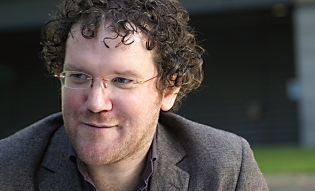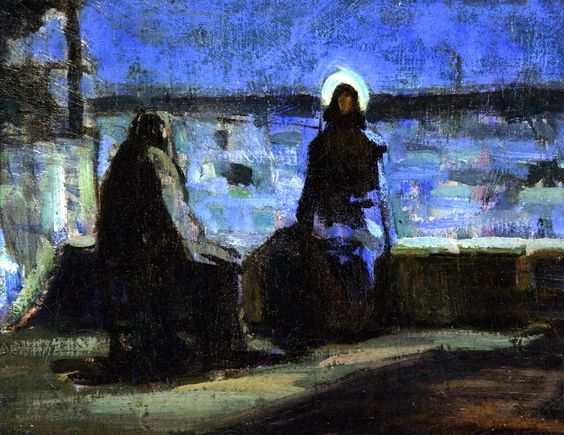Texts: Genesis 12:1-4a + Psalm 121 + Romans 4:1-5, 13-17 + John 3:1-17

“You are the place I stand on the day when my feet are sore.” That’s the English translation for an old Irish saying I recently heard on an episode of “OnBeing,” offered by Pádraig Ó Tuama — poet, theologian, and leader of the Corrymeela community in Northern Ireland. Founded in the 1960s to promote peace and reconciliation during “the Troubles,” that period of violent ethnic and religious conflict in Ireland, today Corrymeela continues to welcome guests from around the world who long for reconciliation with neighbors and fellow citizens in moments when such peace seems hopelessly naïve; moments like the one so many of us feel we ourselves are trapped inside as a nation, when it’s not just our feet that are sore from so many marches, but our hearts and our souls.
“You are the place I stand on the day when my feet are sore.” It’s awfully romantic, don’t you think? The kind of sentiment that seems more at home in a do-it-yourself wedding vow than in a sermon on the doctrine of salvation. But let me ask you this: what do you think a sermon on the doctrine of salvation ought to sound like? Should it be terribly complicated? Should there be lots of Greek and Hebrew words rendered into alternate English translations? Should there be rules, clearly laid out; structures of belief to be agreed with (or not)? What were you taught about “salvation,” and how, and who taught you? Is it the reward for a life well lived? Is it conditional, reserved for only a few? Is it a gift bestowed on the righteous, or the product of their efforts? Are there people who are most certainly saved? Are there people who most certainly are not?

These questions lead us down late-night roads with no lamp posts. If we follow them too far, we can get lost in the dark and may struggle to find our way back. That seems to have been the case with Nicodemus, who came to Jesus by night with questions about the new life that comes by water and the spirit in the reign of God. He was a religious person who’d given plenty of thought to questions of who was chosen, who was saved, and what that all meant. Jesus, however, wanted to talk instead about love.
“Just as Moses lifted up the serpent in the wilderness, so must the Son of Man be lifted up, that whoever believes in him may have eternal life. For God so loved the world that God gave his only Son, so that everyone who believes in him may not perish but may have eternal life. Indeed, God did not send the Son into the world to condemn the world, but in order that the world might be saved through him.” (John 3:14-17)
It’s not hard to see how we worked our way back around to legalism all over again. It’s right there in the text, “so that everyone who believes in him may not perish but may have eternal life.” It seems clear: the key to eternal life is belief in Jesus. Slow down though, and keep asking those questions. What is belief? And, what is eternal life? And, if God is not interested in condemning the world, then why such an oddly specific criterion for salvation as belief in a pretty unbelievable story?
Here’s the prerequisite Greek word study, in case that happened to be on your checklist earlier. When we think about salvation, we often get stuck worrying about what we have to believe in order to be saved — because of this very verse and how it’s been explained. But the verb in Greek which we translate into “believe” in English doesn’t mean “to give credence to a belief or an idea.” Instead, it’s the verb form of the noun (pistis) which means, “faith.” English doesn’t have a verb form of the noun “faith.” We can either say “have faith” — which is a problem because it implies that faith is an object we can possess — or we have to find another verb that comes close to the idea of “faith-ing.” So we’ve said “believe,” though we might just as well have said, “trust.”
It makes more sense when you imagine the kind of conversation in which one person might say to another in a moment of tension, or decision, “I need you to believe in me.” What are they saying? That they need you to agree that they exist? Or that they need you to trust them, to remember something about your shared past, your history, your relationship.
This is what Jesus finally tells Nicodemus, who has gotten lost in the dark, in his questions about being “born again.” Jesus points to the evidence of a loving God, a God who is trustworthy, a God who brought the people through the wilderness, a God who stayed faithful through the exodus and the exile, a God who brought them into a new land and worked with them as they fell into each and every trap that comes with the the problem of being a nation. Salvation is not our reward for having the right answers to the wrong questions. Salvation is God’s work, God’s nature, God’s love.
Why doesn’t that ever feel like enough of an answer? Why do we insist on turning God’s love into a prize rather than accepting it as a gift, a birthright even? How would our lives change if we knew in every cell of our bodies that God is for us? That God longs to be the place we stand on the days when our feet are sore, so much so that God created all the soil and all the earth, so that there is no place we can go where we are not standing in God’s presence. Even when God sends us out from the places we have called home, even when God sets before us challenges that call us into moments and relationships that feel alienating. We are always standing in the loving presence of God.
If we are always already in the presence of God, and we believe — we trust — that God’s love for us is real and true, then what else do we need to experience this thing Jesus calls “eternal life”? What is missing from this picture that is so bad it has us all longing for salvation?
The question the Irish had to face wasn’t whether or not God could love the Catholics and the Protestants. The question was, could they love each other? The question is always: can we love each other? Can the left love the center and the right? Can the winners love the losers, and vice versa. Can we love our enemies? Because, where there is no love, we might as well call it hell, wouldn’t you say?
So, as we continue the practice of holding silence after the sermon for reflections, both spoken and silent, I invite you to consider the following questions as starting points for a conversation with your own spirit that may last well beyond this morning’s worship. If you feel so led, you might offer a few words about where these questions are taking you this morning:
How has love saved you?
Or
How could love save us?